Everything You Touch

(© Joan Marcus)
The path to self-love is much more difficult when images of statuesque models manifest in your most routine daily activities — though, truth be told, most women are haunted by similar shadows. Sheila Callaghan and her accompanying creative team simply give voice (and shape) to this burdensome Greek chorus. They paint with broad and colorful strokes in Callaghan's new fantastical play Everything You Touch, a Rattlestick Playwrights production now running off-Broadway at the Cherry Lane Theatre. Yet each eye-catching contour proves to be much more than simple decoration, driving decisively toward the play's bold dissection of beauty, self-worth, and human connection.
The story flips back and forth between present day and 1970s Manhattan, with two distinct plot lines that initially seem to travel along parallel tracks with no point of intersection in sight. The '70s is where we're introduced to the luxurious fashion designer Victor (played by the brilliant Christian Coulson), who finds a damaged sincerity in Victor's cartoonishly haughty air. Casually flicking the ashes from his cigarette, he screams at a fallen model in an opening monologue, yelling about the divine transcendence of his designs and the uselessness of "time pieces." His works are inspired by his self-proclaimed "muse" Esme, powerfully performed by the seemingly untouchable Tonya Glanz, whose heavy makeup and spangled gowns make her as inaccessible as Victor's fashion line. Together they live a life of simultaneous indulgence and austerity. While basking in some of the world's finest garments, they detach from the most basic aspects of humanity, remaining numb to the Vietnam War and replacing food and water with smokes and alcohol.
Self-loathing and disconnection are just as present post-millennium. They merely take the less glamorous (mis)shape of Jess, played with painfully palpable self-disdain by Miriam Silverman. A grungy computer programmer, Jess' wardrobe consists of baggy jeans, over-size T-shirts, and hoodies that seem to have come from the reject pile at Big & Tall. She's grown accustomed to seedy one-night stands, followed by medicating trips to Chipotle with her coworker and only true companion, Lewis (a charmingly nerdy Robbie Tann), whom she also keeps at arm's length. Her emotional detachment, however, is not for lack of yearning. Callaghan showcases her literary muscle through Jess' poetic "inner monologues," an efficient and satisfying vehicle for her to verbalize her deepest and most shameful thoughts and desires.
Since hearing word of her estranged mother's terminal illness, most of these desires have been directed toward her latest hookup, with whom she finds an intense emotional bond — though she supposes he may just be a collection of "pixels." We're similarly unclear about how real his physical presence is, as he takes the form of Victor — now appearing like a misplaced fashion mogul from a bygone era. Nevertheless, in an act of emotional support, he accompanies Jess on a pilgrimage to Little Rock, Arkansas, to gain closure with her dying mother. The details of Jess' mysterious relationship with Victor (as well as her mother) are revealed over time, just as Callaghan's two-pronged world gradually converges. Still, for the majority of the play we're stuck between two distinct Pygmalion stories: one centered on present-day Jess, who gets a roadside makeover from her ethereal beau, and the other on disco-era Victor, who finds a new, less extravagant muse in a matronly visitor named Louella (a delightfully incongruous Lisa Kitchens).
Director Jessica Kubzansky's creative staging beautifully sorts through this disorienting narrative, while maintaining the dizzying feeling that the worlds represented onstage are something slightly askew from reality. Set designer Francois-Pierre Couture and costume designer Jenny Foldenauer build the play's abstract aesthetic, paying homage to the opulent world of fashion on a downtown-theater budget. It's difficult even to say where Couture's work ends and Foldenauer's begins, as mannequins are molded into furniture and three towering models serve as walking set pieces (a striking group featuring Allegra Rose Edwards, Chelsea Nicolle Fryer, and Nina Ordman).
With ashtrays, gumball machines, bed sheets, and steering wheels strapped to their bodies, they invisibly insert themselves into the lives of each character — a pack of ghosts linking one generation to the next. Yet when these household items are exchanged for fashion-forward runway designs, ferocious personalities emerge from obscurity. Still, the underlying identities of the characters that don these different looks (including our raggedy protagonist) remain elusive. For among Callaghan's parade of stimuli, there's the intriguing suggestion that identity itself may be just as fleeting as last season's handbag.











